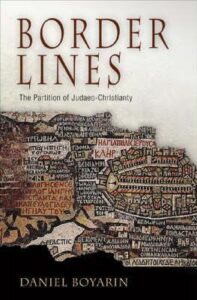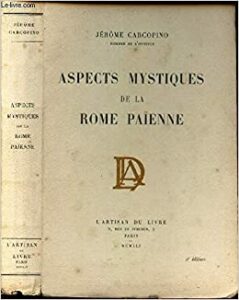 This post presents key ideas in the first part of chapter 3 of part 2 of Jésus-Christ, Sublime Figure de Papier by Nanine Charbonnel. All posts are archived here.
This post presents key ideas in the first part of chapter 3 of part 2 of Jésus-Christ, Sublime Figure de Papier by Nanine Charbonnel. All posts are archived here.So to say that Jesus became flesh the evangelist John can say Jesus “tabernacled” or “tented” among his people just as God once occupied the tabernacle in the wilderness — as we saw in a recent post. But what about the very idea of “The Word (Logos) became flesh” in that same verse, John 1:14?
And the Word became flesh, and did tabernacle among us
That is surely a more complicated concept. Where did that notion come from? It is surely not “Jewish”, is it, although “Judaic” sounds more correct than Jewish in this context. That was the view of Rudolf Bultmann: for him, the concept was “Hellenistic”, even “gnostic”, as distinct from Palestinian-Judaic. NC’s mention of Bultmann deflected me for a moment to his works from which I quote a couple of passages to underline the old view of a strict divide between Hellenism and Judaism:
It is the language of mythology that is here [The word became flesh – Jn 1:14] employed. Just as the ancient world and the Orient tell of gods and divine beings who appear in human form, so too the central theme of the gnostic Redeemer-myth is that a divine being, the Son of the Highest, assumed human form, put on human flesh and blood, in order to bring revelation and redemption. — Bultmann, John, p. 61
The Gospel of John cannot be taken into account at all as a source for the teaching of Jesus, and it is not referred to in this book. . . . [T]hese gospels were composed in Greek within the Hellenistic Christian community, while Jesus and the oldest Christian group lived in Palestine and spoke Aramaic. . . . [E]verything in the [gospels] which for reasons of language or content can have originated only in Hellenistic Christianity must be excluded . . . Bultmann, Jesus, pp. 12f
That was then.
The Word in John’s and Philo’s works — both Hellenistic AND Jewish?
 NC argues that the question is not an either/or one. Either from Hellenism or Judaism. Keep in mind that the label “Hellenistic age” refers to a time of blending of eastern and Greek cultures; it was not a replacement of eastern ideas with Greek ones. NC cites Daniel Boyarin (though I quote him more extensively here) and Boyarin cites several other specialist scholars to affirm that we need to think of the Judaism of the time as a part of Hellenism.
NC argues that the question is not an either/or one. Either from Hellenism or Judaism. Keep in mind that the label “Hellenistic age” refers to a time of blending of eastern and Greek cultures; it was not a replacement of eastern ideas with Greek ones. NC cites Daniel Boyarin (though I quote him more extensively here) and Boyarin cites several other specialist scholars to affirm that we need to think of the Judaism of the time as a part of Hellenism.
Thus, to put one possible point on this, I and many if not most scholars of Judaism currently do not operate with an opposition between Judaism and Hellenism, seeing all of Jewish culture in the Hellenistic period (including the anti-Hellenists) as a Hellenistic culture.73 (Boyarin, Border Lines, p. 18)
73. “Hellenistic ways of life, thought and expression were integral to Jewish Palestinian culture from at least the mid third century [B.C.] on, and these tendencies affected Pharisaism and later Rabbinic writings. Hellenistic schools were especially influential on Jewish modes of organization and expression. The emergence of definable sects, Pharisees, Sadducees, etc. and more importantly the attention given to them fits most comfortably into the Greco-Roman world with its recognized philosophical schools, religious societies and craft assocations” (Anthony Saldarini, Scholastic Rabbinism: A Literary Study of the Fathers According to Rabbi Nathan [Chico, Calif.: Scholars Press, 1982], 19). My only emendation to this important statement would be to abandon language of “influence” and simply understand that “Judaism” is itself a species of Hellenism. See the formulation in Saldarini, Scholastic, 21, which comes closer, I think, to this perspective. Cf. most recently Lee 1. Levine, Judaism & Hellenism in Antiquity: Conflict or Confluence, The Samuel & Althea Stroum Lectures in Jewish Studies (Seattle: University of Washington Press, 1998). In this vein, see Erich S. Gruen, Heritage and Hellenism: The Reinvention of Jewish Tradition, Hellenistic Culture and Society 30 (Berkeley and Los Angeles: University of California Press, 1998), esp. 292: “The [Palestinian] Jews were not so much permeated by the culture of the Greeks as they were a part of it.” Also most recently Schwartz, Jewish Society.
and
Granted that in some areas, Asia Minor almost certainly being among them, Gentile converts began to outnumber Christian Jews at a fairly early date, and that they brought with them, almost inevitably, “hellenophile” and then “antijudaistic” tendencies; however, the lion’s share of the Hellenic thinking of early Christianity — and most centrally, Logos theology — was an integral part of the first-century Jewish world, including Palestine. Jewish theology had for centuries been “open to the thinking of antiquity” — whether Persian or Graeco-Roman — and the binary opposition of Judaism and Hellenism (as well as the binary opposition between Palestinian and Hellenistic Judaism) requires major rethinking. As I have pointed out above, Judaism is from the very beginning a Hellenistic form of culture. As remarked by Rebecca Lyman: “Justin’s appeal to the ultimate authority of divine revelation in prophetic texts or to Jesus as the Logos, the original truth sought by human philosophers, is confrontational, but it is potentially powerful precisely because of its Hellenistic, i.e. Greek and Jewish, lineage in establishing truth through antiquity and transcendence.” (p. 92)
 Though NC’s main focus is on Jewish texts she does at least make a mention of the place of “gnostic” thought as part of the Roman world in the first and second centuries CE. Her quotation from Jerome Carcopino’s Aspects mystiques de la Rome païenne had the effect of sending me off in several directions to track down various books and articles related to Hermetism in the Roman world — hence some of the delay in getting this post up. Literally translated from the French,
Though NC’s main focus is on Jewish texts she does at least make a mention of the place of “gnostic” thought as part of the Roman world in the first and second centuries CE. Her quotation from Jerome Carcopino’s Aspects mystiques de la Rome païenne had the effect of sending me off in several directions to track down various books and articles related to Hermetism in the Roman world — hence some of the delay in getting this post up. Literally translated from the French,
In the Alexandrian circles where ‘Hermetism’ took shape, Asclepius son of Hephaestus, whose wisdom was modelled on that of Imhotep son of Ptah, was considered the intercessor, sometimes associated with Hermes Trismegistus and sometimes standing alone, between humans and the unique divinity of the heavenly Father; and it was he, when it was not Hermes, who opened before them the ways of eternal salvation. […] Hermes or Asclepius, Thoth or Ammon incarnate, under their different names the word of God. In Asclepius, as in Hermes, it is God who shines through, instructs men and guides them on the way to salvation […]. Asclepius, like Hermes, only repeats the word of God; and God himself, throwing out his word of salvation, gives blessings to souls as Asclepius restores health to bodies. (Carcopino, Aspects, pp 258, 265 – translated from NC’s quotation, p. 310. For “Asclepius son of Hephaestus” see Stobaeus.)
I’ll return to Hermetism. But now, let’s look at the Jewish writer Philo of Alexandria to get some insight into how at least some Jews could and did read the Scriptures. Philo was significant enough for Eusebius to quote him alongside the Psalms and book of Job on the topic of the Word. From Praeparatio Evangelica, Book 7, Chapter XIII
Why as if speaking of another God does He say, “In the image [=eikon] of God I made man,” and not in the image [=typos] of Himself? With consummate beauty and wisdom is this oracle expressed. For nothing mortal could be made in the likeness of the Most High God and Father of the universe, but in the likeness of the second God, who is the Word [=logos] of the former. For it was right that the rational character [=typos] in the soul of man should be impressed on it by the divine Word [=logos]; since the God who is prior to the Word is superior to every rational [=logikè] nature; and it was not lawful for any created thing to be made like to Him who is set above the Word [=logos] in the most excellent and unique nature.’
This is what I wish to quote from Philo’s first book of Questions and Answers. But the same author in the first book On Agriculture also calls the Word [=logos] the First-born Son of God, in the following phrase:
‘All these things then God the Shepherd and King guides according to justice, having set over them as a law His own right Reason (Word [=logos]) and First-born Son, who is to receive the charge of this sacred flock, as a lieutenant of a great king.’
Now the logos of Philo must be understood as a concept of Judaism of the day, not as an alien borrowing from Plato.
Philo’s Logos, jointly formed by the study of Greek philosophy and of the Torah, was at once the written text, an eternal notion in the mind of the Creator and the organ of his work in time and space. Under this last aspect, it receives such epithets as Son, King, Priest and Only-begotten; in short, it becomes a person . . . (Edwards, Justin’s Logos, p. 263 – cited by NC)
What we see here is Philo speaking of the Word (logos) as a mediator, and this is an entirely “Jewish” reading that we later find turning up in Christianity. Philo derived the concept from his reading of Genesis 1 and Proverbs 8, as we shall see. At this point, NC stresses the importance of Philo’s notion of language itself, of the Word as God and mediator, again citing Boyarin as he cites others:
Maren Niehoff emphasizes that, for this aspect of his philosophy, Philo apparently did not have previous Greek sources to draw upon. For his notion of man as an Idea, Philo could draw upon his Alexandrian predecessor, Arius Didymus, but for the concept of language itself as an Idea, indeed, perhaps, as the Idea of Ideas, Philo had no known Platonist models.24 This is of signal importance for the present investigation, because it suggests that we look in quite other directions for the Philonic intertexts of this conceptual world: “Philo idealizes language more than man. For him, the ideal language does not at all belong to the realm of createdness. It rather seems to have preexisted with God Himself, thus entirely pertaining to the realm of the eternal, unchanging, most real and most true. In comparison to the ideal man, Divine language also plays a clearly more active and generative role. It is likely that both the enormous importance which Philo attributes to language and its active role as part of the Deity are ideas which are inspired by the natural assumption of God’s speech acts throughout the biblical writings. The idea seems then to have been conceptualized in Plato’s terms of ideal Forms.”25 In other words, a dual move has been made by the Middle Platonist Jew, Philo. The notion of a mediator, a personified demiurge, has been promulgated, but in addition, and perhaps even more striking, that personified mediator, as creator, is identified with the Forms of Plato, which are thus, themselves, in turn, animated or personified as the Logos. Philo’s Logos seems, therefore, a close congener of the Logos theology that we find among almost all ante-Nicene Christian writers. It would appear, therefore, to have a “Jewish” genesis. (Boyarin, Border Lines, pp. 115f)
24. Niehoff, “What Is in a Name?” 226 [link is to PDF]. This is not to say, of course, that there are no anticipations of this development within Platonism, or even Plato himself. Azzan Yadin (personal communication) writes, “The issue is not so much Language as God as Language as intermediary, and here Philo has, arguably, Platonic precedent. I am thinking of the relationship between the aporia that ends the Cratylus and the way language is used in the Sophist, the Statesman, and the Parmenides. One needs different intertexts for language as God but it is not clear that this is the more important of the two for the issue at hand” (letter of November 2000). See now too Mark Julian Edwards, Origen Against Plato, The Ashgate Studies in Philosophy and Theology in Late Antiquity (Burlington, VT: Ashgate, 2002), 16, making just this point. It is unfortunate that this book arrived on these shores just a bit too late for me to take full cognizance of it in the body of this text, but a careful reading suggests that it would not materially affect the hypothesis of this chapter or its sequel. On the question of the Idea of man in Plato himself, see now Edwards, Origen Against Plato, 49.
25. Niehoff, “What Is in a Name?” 226. (p. 289)
 Let’s take a step beyond NC and follow up Boyarin’s first reference to Edwards to see the case for Philo producing the concept of a divine Logos as Mediator and pre-existent with God from “Judaism”:
Let’s take a step beyond NC and follow up Boyarin’s first reference to Edwards to see the case for Philo producing the concept of a divine Logos as Mediator and pre-existent with God from “Judaism”:
The Logos, as the factotum of divine creation and government, is sometimes represented in Philo’s writings as the eternal pattern in the mind of God; this … makes him comparable to the Forms in one legitimate variant of the Platonic theory. Nevertheless we must ask why it is in this form — by no means the most primitive, the most specious or the most favoured in this period — that the theory has imposed itself on Philo. The answer is, of course, that he adhered to a belief which, though occasionally serviceable to Platonists, was mandatory for Jews – the belief in a personal deity, at once benign and sovereign, who not only wills but loves the world, and, if he will suffer any name, elects to be known as Father and Creator. Philo would be conscious that he had met both terms in Plato, but also that he had read them first in scripture; and in any case the Demiuige, as ‘father and creator’ of the generated universe in the Timaeus, would appear to be not the author but an imitator of the unageing paradigm. As for the title Logos, it has yet to be demonstrated that the Platonists ever used it to denote a peculiar organ of the Demiurge or a mediator between the transcendent Godhead and the theatre of the senses. Once again Philo needed to look no further than the opening chapter of Genesis for the notion of creation through the Word, and it was certainly not from Plato that he learned to characterize it by appellatives such as ‘high-priest’, ‘first-begotten’ and ‘son of God’.
Elsewhere, as here, the most innovative thoughts of Philo are authorized by scripture and receive only the most perfunctory countersign from Greek philosophy. (Edwards, Origen, 16)
There is other evidence for the Jewish origin of this idea of the Logos, the Word of God as a mediator and even personified. Will continue this discussion in the next post.
Boyarin, Daniel. Border Lines: The Partition of Judaeo-Christianity. Philadelphia, Pa.: University of Pennsylvania Press, 2006.
Bultmann, Rudolf Karl. Jesus and the Word. Scribner, 1958.
———. The Gospel of John: A Commentary. Edited by Rupert William Noel Hoare and John Kenneth Riches. Translated by George Raymond Beasley-Murray. Philadelphia: Westminster Press, 1971. http://archive.org/details/gospelofjohnco00bult.
Charbonnel, Nanine. Jésus-Christ, Sublime Figure de Papier. Paris: Berg International éditeurs, 2017.
Edwards, M. J. “Justin’s Logos and the Word of God.” Journal of Early Christian Studies 3, no. 3 (1995): 261–80. https://doi.org/10.1353/earl.0.0039.
Edwards, Mark J. Origen Against Plato. Aldershot, Hants, England ; Burlington, VT: Ashgate Pub Ltd, 2002.
Eusebius of Caesarea. Praeparatio Evangelica (Preparation for the Gospel). Translated by E.H. Gifford, 1903. http://www.tertullian.org/fathers/eusebius_pe_00_eintro.htm.
Niehoff, Maren R. “What Is in a Name? Philo’s Mystical Philosophy of Language.” Jewish Studies Quarterly 2, no. 3 (1995): 220–52. http://www.jstor.org/stable/40753132
Neil Godfrey
Latest posts by Neil Godfrey (see all)
- What Others have Written About Galatians (and Christian Origins) – Rudolf Steck - 2024-07-24 09:24:46 GMT+0000
- What Others have Written About Galatians – Alfred Loisy - 2024-07-17 22:13:19 GMT+0000
- What Others have Written About Galatians – Pierson and Naber - 2024-07-09 05:08:40 GMT+0000
If you enjoyed this post, please consider donating to Vridar. Thanks!
